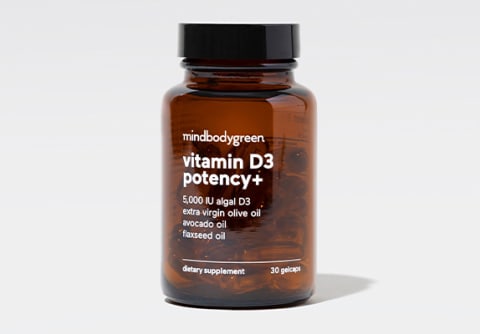Advertisement
This ad is displayed using third party content and we do not control its accessibility features.
Advertisement
This ad is displayed using third party content and we do not control its accessibility features.

Image by Maingaila Muvundika / Stocksy
August 18, 2024
Researchers are working hard to figure out the best way to reduce these climbing numbers and have identified one promising—and shockingly simple—solution: increasing your vitamin D intake.
The connection between vitamin D & dementia
According to a BMC Neurology meta-analysis, vitamin D deficiency (VDD) increases the risk of dementia by one-third (32%), and severe deficiency [defined as at or below 10 ng/ml 25(OH)D serum levels] increases dementia risk by nearly 50%.
So, why is VDD intrinsically linked to neurodegenerative diseases? Researchers hypothesize they’re connected in the following ways.
Calcium homeostasis
Calcium is fundamental to memory formation, and calcium dysregulation has been tied to brain aging and dementia. Vitamin D is a known regulator of calcium homeostasis (hello, bone health benefits).
Antioxidant effects
When there is an excess of the neurotransmitter glutamate, it causes a phenomenon called glutamate neurotoxicity that ultimately leads to the death of neurons.
Considering the growing global rate of dementia and the fact that 29% of U.S. adults3 are deficient in vitamin D, achieving vitamin D sufficiency should be top priority when developing a proactive care plan for maintaining healthy cognitive function with age. The problem? This can be easier said than done.
How to achieve & maintain healthy vitamin D levels
You see, increasing your vitamin D intake is notoriously difficult through food and sunshine. Thus, daily supplementation remains the most effective method for reaching and sustaining healthy vitamin D status.
However, not all vitamin D supplements are created equal—leading health experts recommend 5,000 IU of vitamin D3 every day paired with healthy fat to achieve truly optimal vitamin D levels (i.e., 50 ng/ml or higher).
The takeaway
Vitamin D deficiency increases the risk for dementia, but achieving healthy vitamin D status can help prevent cognitive decline down the road.
If you’re concerned about your brain health and/or vitamin D levels, increase your vitamin D intake. Adding a high-quality vitamin D supplement to your daily routine can help you reach—and sustain—vitamin D sufficiency.
Watch Next
Enjoy some of our favorite clips from classes
Watch Next
Enjoy some of our favorite clips from classes
What Is Meditation?
Mindfulness/Spirituality | Light Watkins
Box Breathing
Mindfulness/Spirituality | Gwen Dittmar
What Breathwork Can Address
Mindfulness/Spirituality | Gwen Dittmar
The 8 Limbs of Yoga – What is Asana?
Yoga | Caley Alyssa
Two Standing Postures to Open Up Tight Hips
Yoga | Caley Alyssa
How Plants Can Optimize Athletic Performance
Nutrition | Rich Roll
What to Eat Before a Workout
Nutrition | Rich Roll
How Ayurveda Helps Us Navigate Modern Life
Nutrition | Sahara Rose
Messages About Love & Relationships
Love & Relationships | Esther Perel
Love Languages
Love & Relationships | Esther Perel
What Breathwork Can Address
The 8 Limbs of Yoga – What is Asana?
Two Standing Postures to Open Up Tight Hips
How Plants Can Optimize Athletic Performance
What to Eat Before a Workout
How Ayurveda Helps Us Navigate Modern Life
Messages About Love & Relationships
Advertisement
This ad is displayed using third party content and we do not control its accessibility features.
Advertisement
This ad is displayed using third party content and we do not control its accessibility features.
Advertisement
This ad is displayed using third party content and we do not control its accessibility features.


